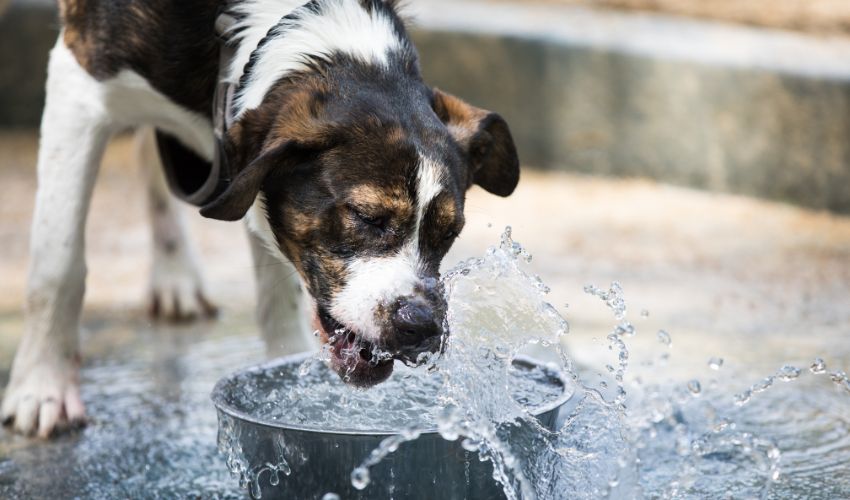Cheese is a gastronomic marvel that has enticed palates for generations with its wide range of flavors, textures, and scents. Every kind delivers a different sensory experience, from the rich, nutty overtones of old Gouda to the tangy and creamy depths of blue cheese. Cheese creates a symphony of flavors that makes it an alluring culinary experience. These flavors include the sharp tang of cheddar, the crumbly decadence of feta, and the velvety smoothness of brie. Cheese can be eaten on its own or combined with a variety of foods; it has a magical quality that transforms flavors from average to amazing. Its exquisite allure is further enhanced by layers of complexity added by the skillful production process, maturing methods, and the effect of terroir.
Cheese is a delicious, high-protein delicacy that many people love, but whether it’s good for dogs depends on a number of things. As a rich source of calcium and protein, dogs can usually handle tiny amounts of plain, low-fat cheese as an occasional treat. But it’s important to take into account a dog’s unique health, dietary requirements, and possible lactose intolerance. Certain dogs may have trouble digesting dairy items due to lactose intolerance, which can result in digestive disorders. Furthermore, some cheeses include a lot of fat and salt, so not all dogs should eat them, especially if they have heart issues or are overweight.

Lactose Intolerance in Dogs
Dogs that have insufficient quantities of the enzyme lactase in their digestive systems are unable to break down lactose, which is a sugar present in milk and dairy products, leading to the disease known as lactose intolerance. As a result, after consuming dairy, dogs with lactose intolerance may have gastrointestinal discomfort, including symptoms like diarrhea, stomach pain, and gas. While some puppies create lactase to digest their mother’s milk, many dogs gradually lose the capacity to adequately break down lactose as they age. It’s critical for dog owners to identify the warning indications of lactose intolerance and to proceed with caution when providing dairy products to their pets. Thankfully, lactose-free substitutes are accessible, enabling dog owners to share goodies with their pets without jeopardizing their digestive health.
Types of Cheese Better for Dogs
According to petMD, there are variety of cheese considered better for dogs.
- Cottage Cheese – Cottage cheese has less fat, less calories, and less lactose than many other cheeses, it’s one of the best options for feeding your dog. It’s also an excellent source of protein and calcium. Additionally, most low-fat, non-sodium cottage cheeses have far less sodium per cup—about 29 mg—than the majority of other cheeses.
- Swiss Cheese – Swiss cheese is not a food that is poisonous to dogs. In terms of nutritional advantages, it offers calcium, a good supply of vitamins A and B, and protein. Swiss cheese can also be a practical and efficient way to give your dog medication and pills if it is provided as a treat; however, it is not advised for antibiotics as mentioned in an article published by DogTime, a famous website that tackles everything you need to know about dogs.
- Parmesan Cheese – For the maintenance of their bones, dogs need calcium. For puppies to grow bones, adults to maintain bone mass, and elderly dogs to avoid fractures, calcium is essential. Give your dog a small amount of parmesan cheese occasionally if you want them to be healthy. Parmesan cheese is high in calcium, but it’s also high in vitamins A and B12. Dogs need vitamin A for healthy skin, clear vision, and thick fur, but they also need vitamin B12 for the creation of their DNA and to avoid anemia.
What is the harm of too much cheese for your fur babies?
Dogs may suffer from eating too much cheese for a number of reasons. Cheese can give calcium and protein when consumed in moderation, but too much of it can be harmful to your health. Cheese is high in calories and fat, and eating too much of it can make dogs obese, which can cause several health problems like diabetes, heart disease, and joint difficulties. Moreover, a lot of dogs struggle to digest dairy items since they are either lactose intolerant or may become so as they age. Overindulging in cheese can cause gastrointestinal issues, particularly in dogs who are lactose intolerant, such as flatulence, pain in the abdomen, and diarrhea. Furthermore, excessive salt content in some cheese varieties might cause dogs’ blood pressure to rise and cause dehydration. Like with any treat, dog owners should give cheese in moderation, take into account the general health of their pet, and speak with a veterinarian to make sure it fits with their pet’s nutritional requirements.
The verdict
In conclusion, cheese can provide dogs with potential health benefits including calcium and protein while also being a tasty and enjoyable treat. It’s crucial for pet owners to understand any possible disadvantages, though. Cheese’s high fat and calorie content can aggravate digestive problems, and the possibility of lactose intolerance might cause obesity and related health problems. It’s important to carefully assess the kind of cheese, serving sizes, and unique requirements of each dog. Cheese may make a wonderful treat when given to dogs in moderation and as part of a diet that is well-balanced. Sharing this human snack with our dog friends can be safe and delightful if we get advice from a veterinarian, keep an eye out for any negative reactions, and consider the dog’s general health.
















